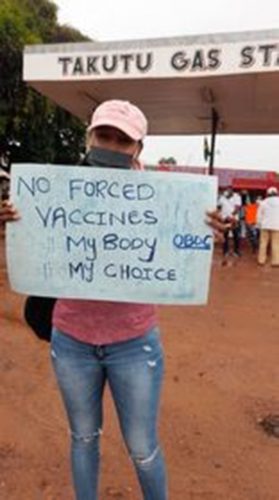Hoping to get the attention of President Irfaan Ali, just over a dozen Lethem residents on Saturday took to the streets to protest against the “indirect mandatory” COVID-19 vaccination policy that was implemented by the government in August.
Cognizant that the president would be in the Region to deliver a feature address at the Regional Toshaos Meeting, residents of Lethem in Region Nine planned a protest to voice their concerns regarding the COVID-19 vaccine and the negative PCR test required in order for them to work or access government services.
The protestors gathered in front of the Takutu Gas Station which is located on the route that the president was expected to pass and within an hour of his arrival, they began their protest. It lasted for several hours even though the presidential convoy did not stop to acknowledge the gathering.

However, the protestors believed that their message was received and are hoping that there will be changes to the vaccination policy. Stabroek News was told that the protestors consisted mainly of parents and a few teachers.
According to one of the protestors, who did not wish her identity to be known, this was not the first protest that residents have staged in Lethem regarding the COVID-19 vaccine and PCR-test requirement. She said that they usually protest on Mondays, Wednesdays, and Fridays, but this protest was special because they knew that the president would be in the region and they hoped that he would listen to their voices.
“We are protesting against the forced vaccination. We are not against vaccination. I think everybody has a right to choose whether they want to be vaccinated or not. That is our right and it should not be taken away from us,” she responded when asked what her reason for protesting was.
Her sentiments were echoed by several others.
He added that while regional government officials have embarked on public awareness campaigns in the region, the strategies they have been using are all wrong, as all they do is go into villages and tell the residents that if they take the vaccine, their illnesses will be cured.
He went on to describe the vaccination policy as “indirectly mandatory” noting that there is no private institution in the entire region that can provide PCR testing.
“This is why we are saying that it is an indirect mandatory vaccination programme, [as] we don’t have these things [private hospitals] here. As a matter of fact, for the Rupununi in particular, you have to pay over $20,000 to go to Georgetown if you want to get tested against the virus. Then you might spend about two days on the road and still have to travel back down to go to work, so that clearly states that it is mandatory vaccination,” he contended.
According to the protest coordinator, they felt that it was necessary to stage the demonstration because they want the president’s attention and they don’t believe that the government should impose such a harsh requirement on the people.
As it is now, he said, the policy is dividing the country as persons who took the vaccine believe that that they are better than the ones that haven’t. He noted the treatment they had received in addition to the requirement has pressured many persons to take the vaccines but those persons are still fighting against the government’s vaccination policy.






